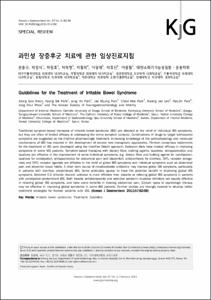KUMEL Repository
1. Journal Papers (연구논문)
1. School of Medicine (의과대학)
Dept. of Internal Medicine (내과학)
과민성 장증후군 치료에 관한 임상진료지침
- Keimyung Author(s)
- Park, Kyung Sik
- Department
- Dept. of Internal Medicine (내과학)
- Journal Title
- Korean Journal of Gastroenterology
- Issued Date
- 2011
- Volume
- 57
- Issue
- 2
- Keyword
- Irritable bowel syndrome; Treatment; Guideline
- Abstract
- Traditional symptom-based therapies of irritable bowel syndrome (IBS) are directed at the relief of individual IBS symptoms, but they are often of limited efficacy in addressing the entire symptom complex. Combinations of drugs to target bothersome symptoms are suggested as the first-line pharmacologic treatment. Increasing knowledge of the pathophysiology and molecular mechanisms of IBS has resulted in the development of several new therapeutic approaches. Thirteen consensus statements for the treatment of IBS were developed using the modified Delphi approach. Exclusion diets have modest efficacy in improving symptoms in some IBS patients. Symptom-based therapies with dietary fiber, bulking agents, laxatives, antispasmodics and laxatives are effective in the improvement of some individual symptoms, e.g. dietary fiber and bulking agents for constipation, laxatives for constipation, antispasmodics for abdominal pain and discomfort, antidiarrheals for diarrhea. 5HT3 receptor antagonists and 5HT4 receptor agonists are effective in the relief of global IBS symptoms and individual symptoms such as abdominal pain and abnormal bowel habits. A short term course of nonabsorbable antibiotics may improve global IBS symptoms, particularly in patients with diarrhea- predominant IBS. Some probiotics appear to have the potential benefit in improving global IBS symptoms. Selective C-2 chloride channel activator is more effective than placebo at relieving global IBS symptoms in patients with constipation-predominant IBS. Both tricyclic antidepressants and selective serotonin reuptake inhibitors are equally effective in relieving global IBS symptoms, and have some benefits in treating abdominal pain. Certain types of psychologic therapy may be effective in improving global symptoms in some IBS patients. Further studies are strongly needed to develop better treatment strategies for Korean patients with IBS. (Korean J Gastroenterol 2011;57:82-99)
요 약
1) 증상을 악화시키는 음식의 제한은 과민성 장증후군의 치 료에 도움을 줄 수 있다. 그러나 제한식이요법이 효과적인 치 료법이라는 증거수준은 낮으며 향후 잘 계획된 무작위 연구가 필요하다.
2) 부피형성 하제는 변비, 복통 등 과민성 장증후군의 일부 증상의 치료에 도움을 준다. 그러나 부피형성 하제를 복용하 면 복부팽만감이나 가스를 유발할 수 있다는 점을 고려하여야 한다.
3) 변비형 과민성 장증후군 환자에서 삼투성 하제는 배변 횟수를 증가시키는데 도움을 줄 수 있다. 그렇지만 통증 등의 증상은 감소시키지 못한다.
4) 진경제는 과민성 장증후군 환자에서 복통 및 복부 불편 감의 치료에 효과적이며, 약제와 관련된 심각한 부작용은 없 고 비교적 안전한 약물로 생각된다.
5) 지사제는 과민성 장증후군에서 배변 형태를 호전시키고 배변 횟수를 줄이는데 도움을 준다. 그렇지만 변비를 유발할 수 있어 설사형 과민성 장증후군이 아닌 경우에는 투여시 주 의가 필요하다.
6) 세로토닌 3형 수용체 길항제는 설사형 과민성 장증후군 환자에서 전반적인 증상, 복통 및 복부불쾌감, 배변 습관 등의 호전에 효과적인 약제로 생각된다.
7) 세로토닌 4형 수용체 작용제는 변비형 과민성 장증후군 환자에서 전반적인 증상의 호전에 도움이 된다.
8) 비흡수성 경구용 항생제의 단기간 투여는 일부 과민성 장증후군 환자에서 전반적인 증상의 호전에 도움이 된다.
9) 프로바이오틱스는 일부 과민성 장증후군 환자에서 증상 의 완화에 도움을 줄 수 있다.
10) 선택적 C-2 염소통로 활성제는 변비형 과민성 장증후 군 환자의 치료에 효과적이며 특히 배변 형태를 무르게 하고 복통의 완화에 도움이 된다.
11) 삼환계 항우울제와 선택적 세로토닌 재흡수 억제제는 일부 과민성 장증후군 환자에서 전반적인 증상의 완화에 도움 을 줄 수 있으며 비교적 안전하게 사용할 수 있는 약물이다.
12) 정신과적 치료 중 인지-행동요법,역동정신요법,최면 요법은 일부 과민성 장증후군 환자의 치료에 도움을 준다.
13) 과민성 장증후군은 여러 가지 병태생리가 관련되어 다 양한 증상을 보이는 이질적인 질환군이며,관련된 병태생리나 증상에 대한 약제를 조합하는 것이 치료에 효과적이다.
- Alternative Title
- Guidelines for the Treatment of Irritable Bowel Syndrome
- Keimyung Author(s)(Kor)
- 박경식
- Publisher
- School of Medicine
- Citation
- 권중구 et al. (2011). 과민성 장증후군 치료에 관한 임상진료지침. Korean Journal of Gastroenterology, 57(2), 82–99. doi: 10.4166/kjg.2011.57.2.82
- Type
- Article
- ISSN
- 1598-9992
- Appears in Collections:
- 1. School of Medicine (의과대학) > Dept. of Internal Medicine (내과학)
- 파일 목록
-
-
Download
 oak-aaa-4595.pdf
기타 데이터 / 604.99 kB / Adobe PDF
oak-aaa-4595.pdf
기타 데이터 / 604.99 kB / Adobe PDF
-
Items in Repository are protected by copyright, with all rights reserved, unless otherwise indicated.